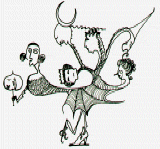|
Antique Late 18th Century
brass bound writing box Circa 1790.
Please click on images to enlarge | slide show | thumbnail
index |
Reference: wb143
Description:
Brass bound Solid mahogany writing box of dovetail construction in
the military style with drop side handles and side drawer for papers.
Inside there is a sloping leather writing surface (mid Victorian
replacement). There are further compartments for papers and writing
implements. There is a nest of secret drawers hidden behind a panel. The
box also has an adjustable riser enabling it to be used as a reading
stand 1790
Origin: UK
Circa: 1790
Size: 50.1cm by 25.2cm by 16.6cm: 19.7 inches by
9.9 inches by 6.5 inches. Condition:
The box is in good condition overall but shows clear signs of
use. There are some cracks to the wood in the top which have been reinforced
with a sheet of mahogany veneer. The working lock and key, the leather
writing surface and one of the carrying handles are Victorian
replacements. See images.
|
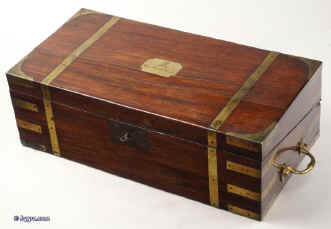
|
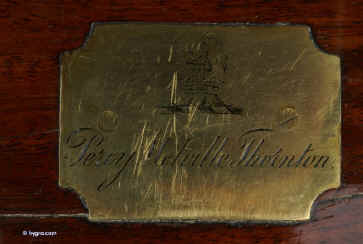
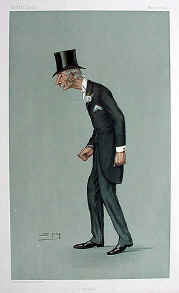
Percy Melville Thornton as he was pictured by Spy in
Vanity fair.
|
The plate in the center of
the top is engraved Percy Melville Thornton and also has his
crest.
Percy Melville Thornton
(1841-1918) was a polatation MP for Clapham, cricketer and writer.
There is a photograph of him at a lunch party for English Aviators
taken 1909 in the National
Portrait Gallery.
Cricinfo
give the following biography:
Though never prominent as a
cricket player Mr. Percy Thornton was all through his life a
prominent and most popular figure in the cricket world.
He was closely associated with
Middlesex Cricket Club, being for some years honorary secretary to the
club. He excelled far more at athletics than at cricket, being a good
half-mile runner in the early days of athletics. He sat for many years
as M.P. for Clapham. Cousin of Mr. C. T. Thornton.
Wisden Cricketers' Almanack
He was secretary of Middlesex from
1870 to 1898 and Hon. Secretary of the Cambridge University Athletic
Club when he helped found the inter-university sports in 1864. He was
MP for Clapham from 1892 to 1910.
|
Please click on images to enlarge | slide show | thumbnail
index |
The box is constructed with full-blind
dovetail joints. The brass is fixed with iron screws which have their
heads ground down level with the brass. The result is a strong and stable
box which has survived well the harsh environments it has had to
encounter,
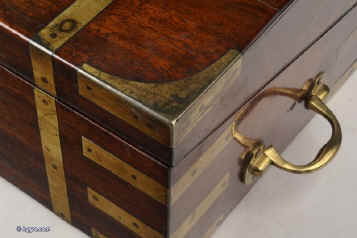
Extract: Choosing and Making the right
joints by Tage Frid.
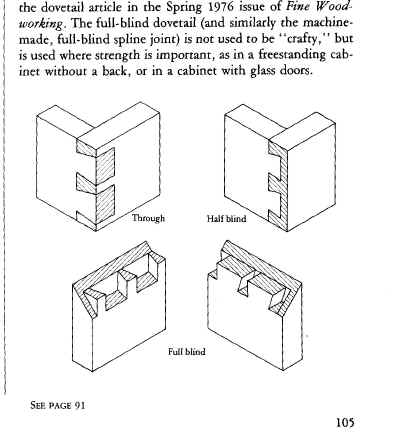
This image is courtesy of Fine Woodworking Techniques 1978
Taunton Press inc. ISBN: 0918804027
You can
order the Fine Woodworking Techniques from Amazon by clicking one of the links below:
|
Dovetail joints:
The dovetail joint is one of the
wonders of woodwork. In the full blind none of the careful work is
visible. If the joint is simply mitered it will not survive
atmospheric change. A mitered joint is end grain to end grain. The
glue soaks in, becomes dry and brittle and falls apart.
The dovetail joint enables side
grain to be glued to side grain. These joints would hold together
without glue!
It is the true proof of these
dovetail joints made by craftsmen 200 years ago that their joints are
as they made them.
This image is courtesy
of Fine Woodworking Techniques 1978 Taunton Press inc. ISBN:
0918804027
You can
order the Fine Woodworking Techniques from Amazon by
clicking one of the links below:
|
|
Detail of side carrying handle
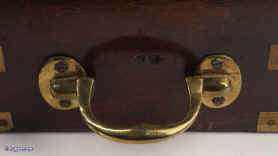
|
Please click on images to enlarge| slide show | thumbnail
index |
Please click on images to enlarge
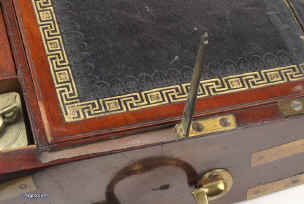
|
Detail showing the adjustable prop used when the box is in
the reading stand position.
|
Please click on images to enlarge| slide show
| thumbnail
index |
The box retains its mid Victorian replacement
writing surface
|
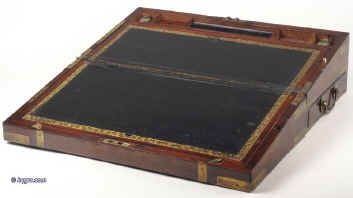
|
Please click on images to enlarge| slide show | thumbnail
index |
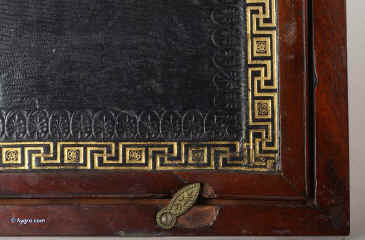
|
The leather writing box is a mid Victorian replacement
It is decorated with a Greek key pattern in gold embossing and a
palmette in blind.
|
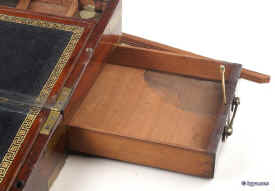
|
There is a side drawer which is released by pulling
the brass rod upwards.
|
Please click on images to enlarge| slide show | thumbnail
index |
Detail showing the hand cut dovetails and the handle.
|
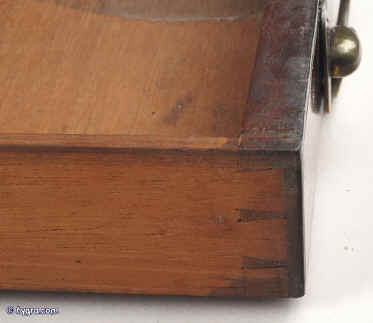
|
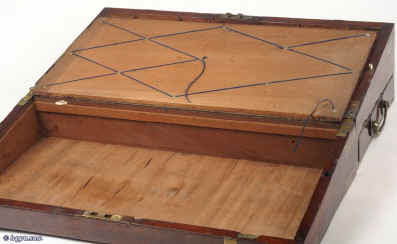
|
The inside of the top has been reinforced with a sheet of
mahogany veneer.
|
Please click on images to enlarge| slide show
| thumbnail
index |
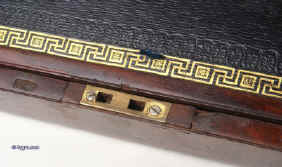
|
The lock is a mid Victorian
replacement
|
Please click on images to enlarge| slide show | thumbnail
index |
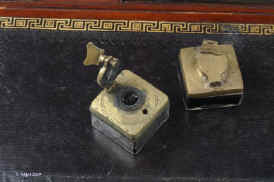
|
The are two original brass topped inkwells with screw tops.
|
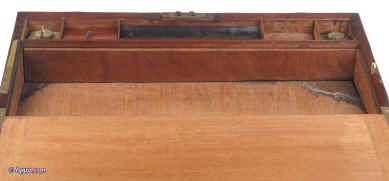
|
Under the flaps there are compartments for storing
papers. There are secret drawers concealed behind the panel |
Please click on images to enlarge| slide show
| thumbnail
index |
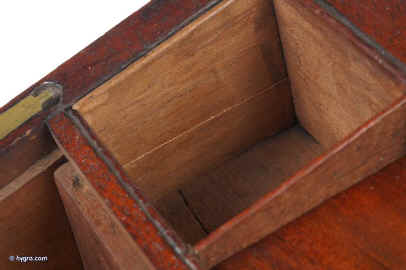
|
The secret drawers are
reveled by pressing the side of the box
|
Please click on images to enlarge| slide show
| thumbnail
index |
Please click on images to enlarge| slide show
| thumbnail
index |
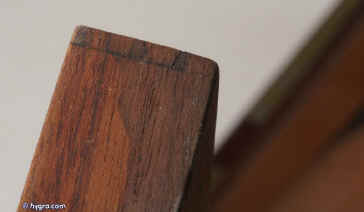
|
The secret drawers are constructed with dovetails |
Please click on images to enlarge| slide show
| thumbnail
index |
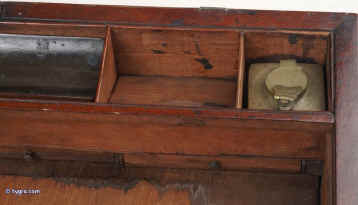
|
A
|
Please click on images to enlarge
Request
current list of available writing boxes.
News
| Buying
| email | Online
History of boxes | The
Schiffer Book |
All text and images and linked images are ©
1999-2007 Antigone Clarke and Joseph O'Kelly. If you require any further
information on permitted use, or a licence to republish any material, email us
at copyright@hygra.com
| 